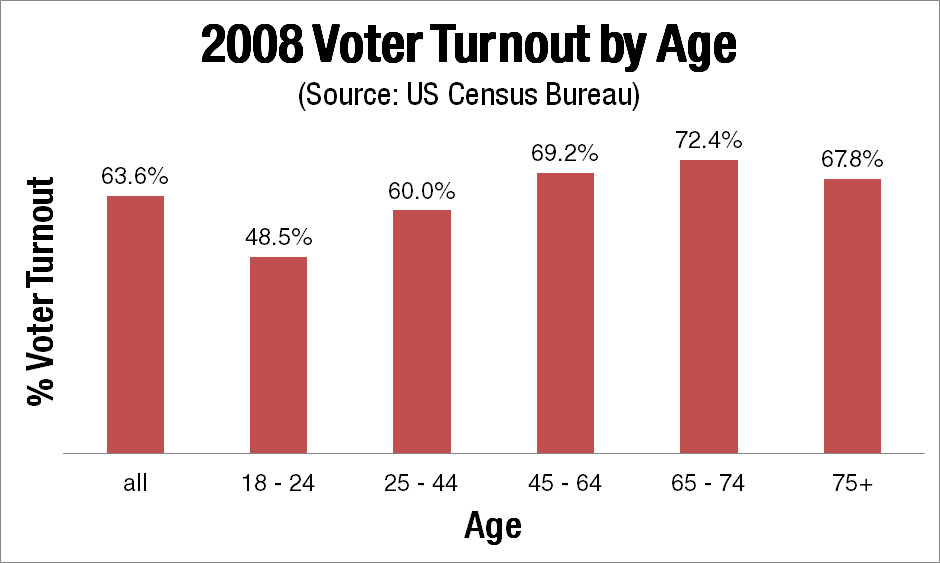Already, we are being inundated with stories about the how social media will shape the 2012 campaigns (and how Facebook may, or may not, transform the Presidency itself). Two facts, however, limit the potential role social media will, ultimately, play in the 2012 election:
1.) Young people are heavy users of social media, but are unlikely to vote.
2.) Older folks are likely to vote, but are much less involved in social media.
Thus, the reality is that social media is best at reaching those least likely votes. In its 2008 post-election analysis, Pew found that while 72% of Americans 18-29 year of age were using the Internet for political activities or information gathering (and 49% used social-networking sites for these purposes), only 22% of Americans 65+ years of age engaged in such activities on the Internet (and a mere 2% did so on social media).

At the same time, young adults are roughly 33% less likely to vote than their grandparents. (Note: I had to hunt down a different source of data, so the age groupings vary slightly compared to the previous table.)

While the influence of social media may be somewhat over-hyped, social media should not be ignored. This age-based line of analysis does, in fact, indicate that social media is likely to play a more significant role in 2012 than it did 2008, because, though a majority of Americans 56 years and older are still not on social media, the number of users in age group has tripled in just a few short years.

The inverse proportionate relationship between social media use and voting will likely attenuate the impact of organization and communication through Twitter, Facebook, and other such platforms in the coming election; nevertheless, social media is on course to continue playing a larger role in most aspects of our lives, including electoral politics.

Comments 5
Daily Links for June 2nd | Akkam's Razor — June 3, 2011
[...] The Social Media Age Gap and the 2012 Elections [...]
nathanjurgenson — June 3, 2011
cool analysis, pj! though, i would not downplay that the strength of the inverse relationship between social media use and likelihood to vote is weakening.
also, is correlation the appropriate method here? imagine a future where 100% of people younger than 65 use social media and say 80% of 65+ use social media and still vote more often. in that scenario social media is hugely important, but we still have that same negative relationship. perhaps we should look at the number of social media users multiplied by their likelihood to vote?
in any case, as younger social media users get older and vote more, and as older voters use social media more, we see a fairly linear and positive trend towards the increasing importance of social media.
replqwtil — June 3, 2011
I have to say. As a Canadian, it is very interesting to watch the buzz which surrounds American elections. It is really a whole different world than us!
But I am really curious to know what cyborgologists think the effects of social media are likely to be on American electoral politics.
Is there any empirical work done on the role that it has played in previous elections?
&
what kind of narrative do you think that data would paint?
The Social Media Age Gap and the 2012 Elections « PJ Rey's Sociology Blog Feed — June 20, 2011
[...] is a re-post. The original can be found here on the Cyborgology [...]